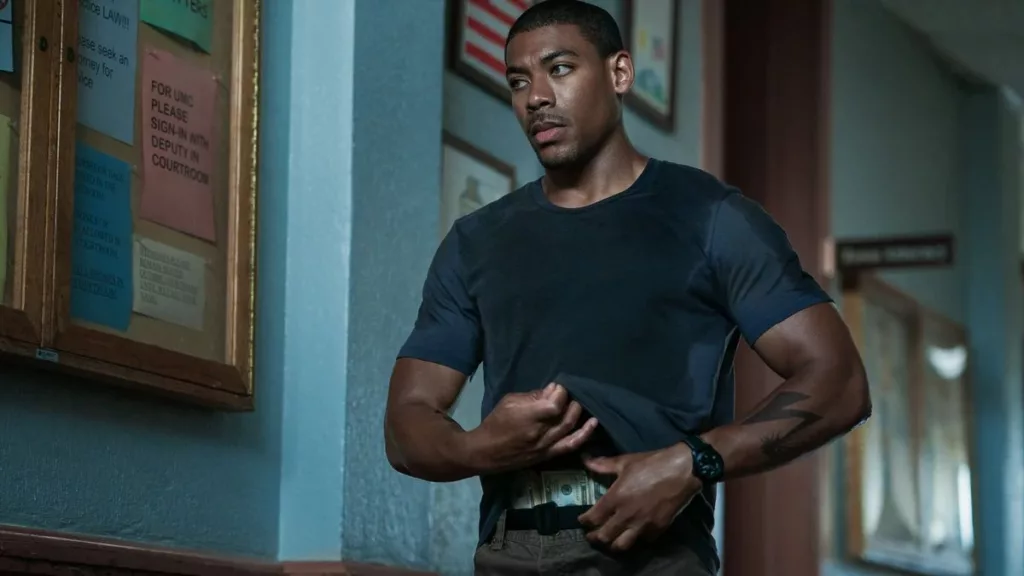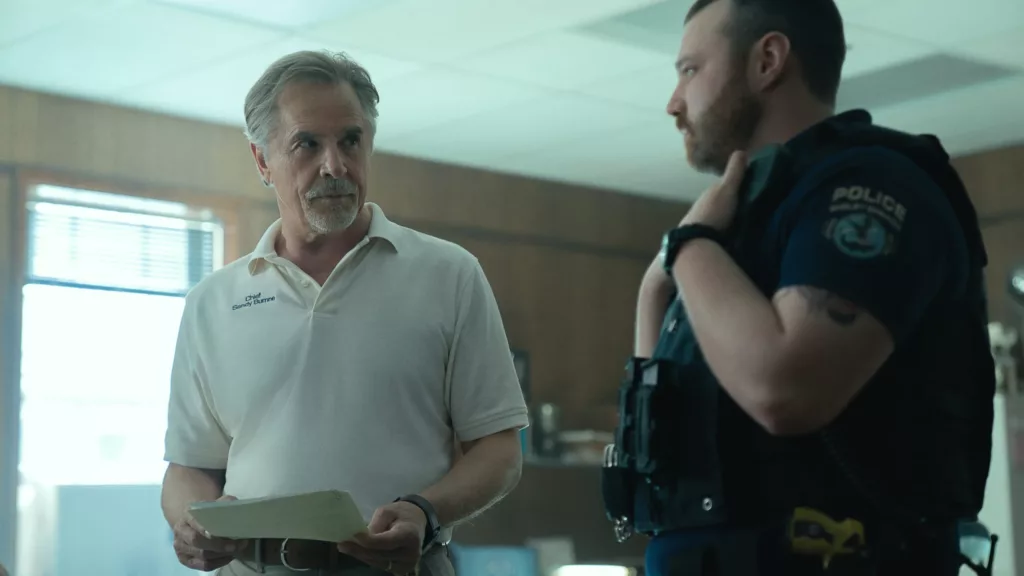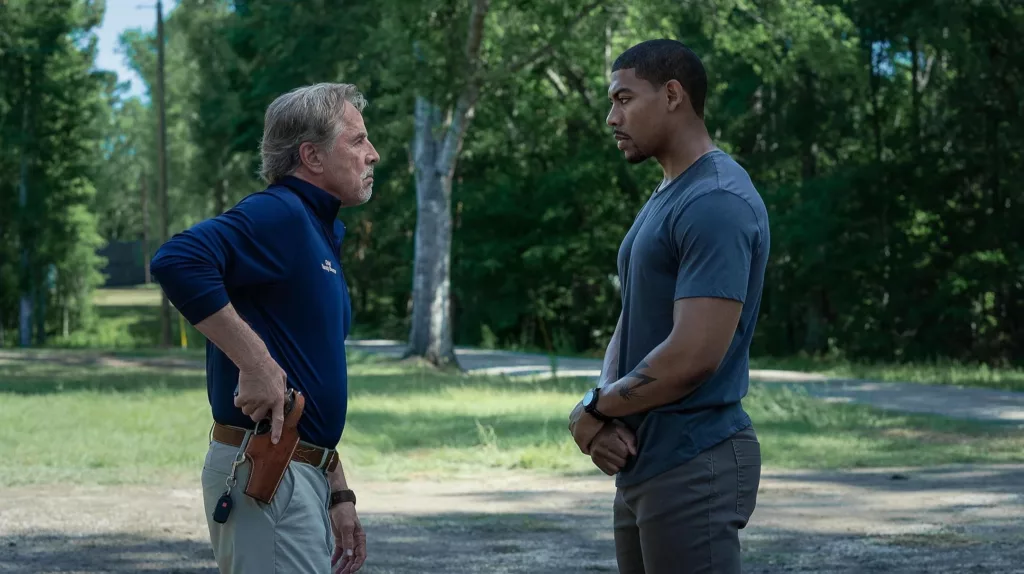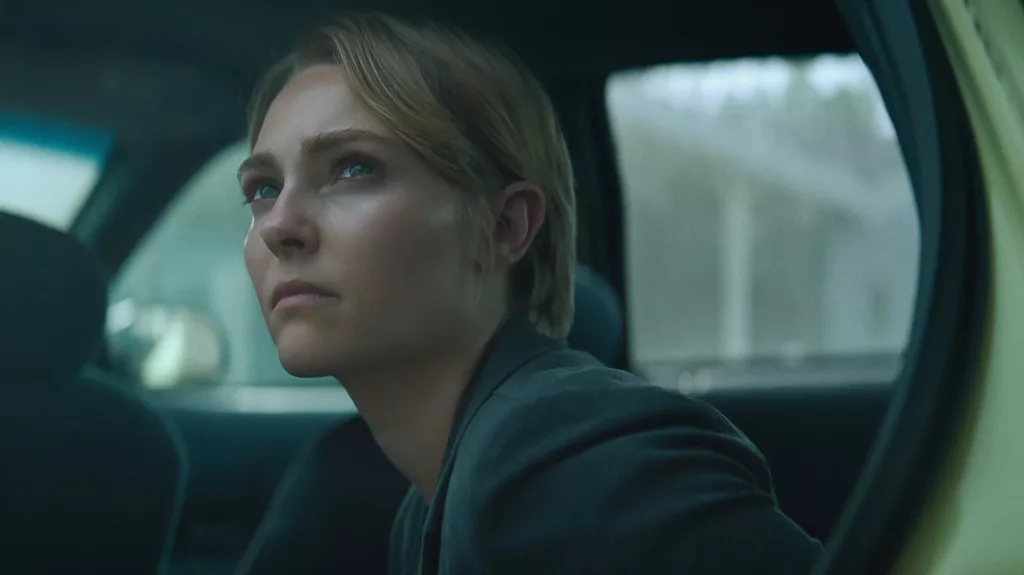Jeremy Saulnier’s new film Rebel Ridge tackles an issue at the forefront of many Americans’ minds—the role and overreach of local law enforcement. Streaming on Netflix, the movie tells the story of Terry Richmond, a man traveling through a small Louisiana town who has the misfortune of encountering the town’s crooked police force. They seize Terry’s money through the questionable practice of civil asset forfeiture, starting a dispute that escalates dramatically as Terry strives to hold those in power accountable.
At its core, Rebel Ridge presents a fast-paced thriller in the style of classic 80s action movies. But it uses that framework to shed light on modern problems within America’s legal system. Issues like asset forfeiture and police abuse of power are infused throughout the narrative in a way that remains highly engaging, even as the film delivers its socially conscious message. Star Aaron Pierre brings an intensity and nuance to the role of Terry that makes confronting these serious topics quite thrilling.
Director Jeremy Saulnier balances these substantive themes skillfully with the suspense and confrontations expected of the genre. His direction keeps audiences continually wondering what twists may come while also ensuring the commentary lands meaningfully. This review will take a close look at Rebel Ridge’s multifaceted story, its complex characters, and how Saulnier crafts what could have been a simple thriller into a work with real insight into society’s challenges. By the end, it will hopefully be clear that beneath the pulse-pounding surface is a film that both entertains and encourages important discussion.
Setting the Stage for Battle
The small town of Shelby Springs, Louisiana, plays host to the drama that unfolds in Rebel Ridge. It’s here that we first meet Terry Richmond, introduced riding his bike down a country road with music blasting in his ears. Seemingly a normal afternoon, it all changes in an instant when a police cruiser rear-ends Terry.
As Terry lies stunned on the pavement, the officers believe he was fleeing arrest. Yet their supposed reason for tailing him seems thin. When they search Terry and discover a large sum of cash, they twist the law to seize the money through civil asset forfeiture. This money was intended to bail out Terry’s cousin Mike, who faces danger in prison.
Under the guise of the police just doing their job, the truth is clearer to the audience. The cops have profiled and wrongfully accused Terry from the start. Now they’ve stolen the means to help his family, pushing our protagonist towards confrontation.
Terry navigates the bureaucratic runaround, attempting to reclaim his funds, finding little hope amid the indifference of the system. All the while, the clock ticks as his cousin’s transfer date looms. Driven to act, Terry sets out to battle the corruption he uncovers extending far beyond these two officers.
From here, the story evolves through Terry’s interactions with an array of colorful characters. Each brings new twists as Terry strategizes how to outmaneuver small town power dynamics. His dealings with the smug police chief and those assisting or standing in his way breed ever-higher stakes.
Rebel Ridge constantly raises the tension through the believable escalation of each situation. Events spring from the last in a way that feels unpredictable yet inevitable. By keeping audiences constantly playing catch-up, the film immerses us in Terry’s mission with bated breath.
The Complexities Within
At the center of Rebel Ridge stands Aaron Pierre’s intense portrayal of Terry Richmond. Bringing a nuanced restraint to such a physically imposing man, Pierre turns Terry into a thoughtful hero we root for unequivocally. His calm exterior belies a willingness to meet brutality with firm action when all other options fail. Yet Pierre ensures we feel the currents of emotion simmering below Terry’s steely surface.
Through the subtlest gestures, we see the outrage and fear driving this good man to extremes. Pierre finds profound humanity even in Terry’s darkest urges, keeping him a grounded figure fighting injustice for understandable reasons. Despite overwhelming odds, Pierre makes us believe in the quiet strength guiding Terry’s personal revolution. His is a thrilling star turn deserving far greater recognition.
Alongside Pierre stands Don Johnson, relishing his role as a vindictive small town boss unwilling to brook defiance. With smarmy charm and a petty need to provoke, Johnson makes the police chief a detestably authentic villain. We understand why Terry cannot relent against such a man, no matter the cost.
As Summer, AnnaSophia Robb brings moments of empathy amid bureaucratic apathy. Yet her character’s convoluted backstory feels like an unnecessary distraction from Terry’s perspective. Minor roles like Mike remain vague figures, hinting at real people forgotten to the margins of a corrupt system.
Within even its supporting characters, Rebel Ridge captures messiness rarely seen in genre films. No character fits neatly into boxes, a reflection of life’s complexities that elevates this thriller into essential viewing. By embracing ambiguities within people placed in impossible situations, it finds profound truth in entertainment intended to be nothing more.
Masters of Suspense
Jeremy Saulnier brings a keen control to the narrative and visuals of Rebel Ridge. From start to finish, tension relentlessly builds thanks to the director’s taut pacing. Little exposition is needed as the story flows smoothly from one fraught situation to the next.
Action and quieter dramatic scenes are handled with equal skill. Fights are gritty and grounded yet still pulse-pounding. Intimate moments simmer with subtext as words take backup to expressive performances. Minimizing cuts for fluid long takes, Saulnier immerses the audience in Terry’s escalating plight.
Authentic production design transports us to rural Louisiana. Worn costuming captures the world’s lived-in feel. Cinematography by David Gallego brings vivid life to both bleak terrain and intimate interiors with rich, nuanced lighting. Subtle details reinforce context, whether gleaned from objects, locales, or behaviors.
Rebel Ridge partakes of the Western genre. Yet where classics offered crude justice, Saulnier sees a system broken beyond repair. Where many actioners glorify violence, Terry’s restraint underscores deeper corruption survived through pragmatism alone. This more cynical tone intensifies unease at oppression masquerading as order.
While earlier films pushed extremes, Rebel Ridge achieves tense suspense through balance. Graphic kills meant catharsis for Green Room’s righteous fury. Here, held impulses ratchet pressures higher while cultivating wisdom in restraint. Control ushers understand that solutions lie not in mirroring corruption but in navigating it to find humanity on any terms left possible.
Through precision blending action, drama, and message, Saulnier proves a modern master of suspense. Rebel Ridge stands alongside his finest due to skills ensuring every piece works in nuanced concert, keeping viewers on edge in the best ways.
Speaking Truth to Power
Woven into the pulse-pounding action of Rebel Ridge lies a potent message about abused systems. The corruption infiltrating Shelby Springs stems from people exploiting power and procedure solely for personal gain.
The targeting of Terry from the outset, a black man singled out by white officers, underscores this story’s timely commentary. Subtly but significantly, racial dynamics play a role in the ease with which authority figures distort laws against the powerless.
Bureaucracy intended to uphold justice instead becomes an impenetrable labyrinth, minimizing accountability. The film shines a spotlight on civil asset forfeiture, allowing seizure with no proof of wrongdoing. Like Terry’s cash, people’s lives become burdened by rules applied in the most exploitative sense.
Rebel Ridge echoes real issues like those stirring national conversations on policing. By narrowing its focus, the movie underscores how such immense challenges persist even on small scales, where a few corrupted individuals can undermine entire communities.
Yet for all its bleak implications, the movie leaves room for optimism. Among the many ordinary characters choosing compliance, Terry emerges fighting one flawed piece of a larger machine. His solitary battle symbolizes how relentless individuals can still make a difference no matter how broken the world seems. By speaking truth in a single town, perhaps broader change may follow.
Capturing the Chaos of Confrontation
Jeremy Saulnier’s films live or die on the strength of their technical foundations. In Rebel Ridge, these elements seamlessly enrich the narrative tension. Cinematographer David Gallego brings the rural Louisiana vistas to vivid life. Subtle lighting ensures settings feel authentic while intensifying desired emotions.
Editing by Saulnier himself keeps the story clipping along at a breathless pace. Fights flow naturally from dialogue without excess flourish. Scene transitions feel organic rather than merely functional. Music is deployed to unexpected yet fitting effect, like ironic needle drops amid determined action.
Fight choreography realistically captures the grounded complexity of close-quarters combat. Fists and maneuvers flow believably from each character’s portrayed abilities. Saulnier forgoes cutting for fluid long takes immersed in the struggles’ brutal intimacies.
Sound arguably elevates sequences most of all. Each impact resonates physically through bass-enhanced mayhem. Transitions sharpen with crisp audio cues while dialogue stays crisp and clear. Environmental sounds subtly heighten settings’ ambient immersions too.
Together, these technical achievements transform potential set pieces or expositions into true engagements. Viewers become fully invested participants rather than passive observers of a story. Through such mastery, Saulnier consistently stimulates multiple senses at once for lasting resonance long after any single viewing.
Seeing Beyond the Surface
Beyond pulse-pounding action, Rebel Ridge proves a thoughtful look at contemporary issues. Jeremy Saulnier’s meticulous direction ensures each element—ffrom cinematography to dialogue—wworks in nuanced concert to tell a story resonating far beyond primal thrills.
Aaron Pierre brings Terry Richmond to life as a complex figure, outwardly calm yet simmering with understandable outrage. Through him, we experience enthralling battles against corruption on a larger scale, mirroring larger systemic failures. Terry shows how persistent individuals can still move mountains, giving hope even for massive challenges.
Rebel Ridge entertains thoroughly as a tightly plotted thriller. Yet it succeeds on deeper levels too through character-driven social commentary. By minimizing exposition, Saulnier lets us uncover implications through lived-in details and situations escalating believably from real human choices.
Through balancing message and entertainment so skillfully, this film deserves wide audiences to promote discussions long deferred. With a hero as endlessly compelling as Terry, opportunities for further exploring this world seem endless. Perhaps future installments may shine light into even darker corners where it’s needed most.
For now, Saulnier’s razor-sharp writing and directing prove him a modern maestro of nuanced suspense. Through him, Netflix delivers one of its finest originals to date: a work as thoughtful as it is, as smart as it is gripping, and as meaningful as it is fun.
The Review
Rebel Ridge
Jeremy Saulnier's Rebel Ridge is a tour de force blend of page-turning thriller thrills and poignant social commentary. With precise direction and constant narrative and tonal balance, it proves entertaining popcorn requires no sacrifice of meaningful subtext. At its heart lies Aaron Pierre's intense central performance as Terry Richmond, bringing grit, wisdom, and hope to a character at once familiar and fresh. Reversing action hero tropes while facing systemic flaws head-on, Rebel Ridge feels as timely and urgent as it is compulsively watchable. Saulnier proves genre storytelling at its best need not choose between engaged art and sheer diversion.
PROS
- Engaging story and characters
- Timely social commentary on police accountability
- Taut direction keeps interest throughout
- Pierre anchors the film with a nuanced lead performance
- Balances action and thoughtful consideration of themes
CONS
- Summer's backstory subplot feels extraneous
- Could have explored Terry's backstory more
- Action climax somewhat anticlimactic






















































Discussion about this post